新概念英语第一册 Lesson 99- 102 课件(共68张PPT)
文档属性
| 名称 | 新概念英语第一册 Lesson 99- 102 课件(共68张PPT) | 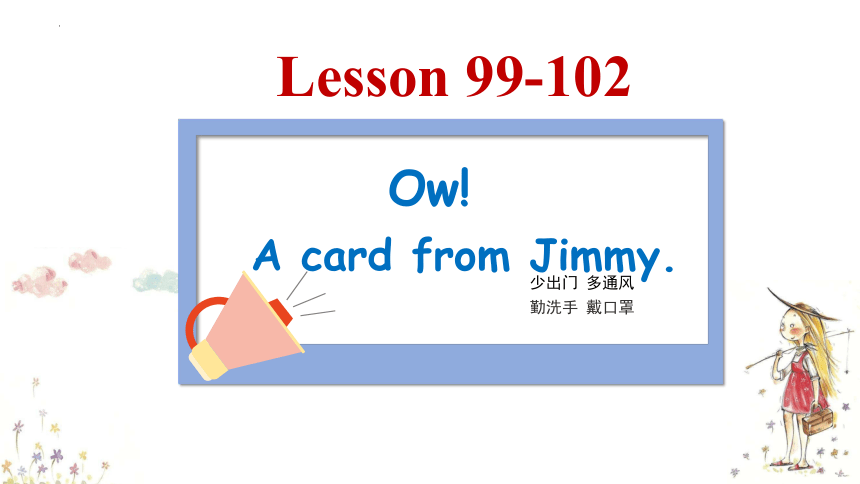 | |
| 格式 | pptx | ||
| 文件大小 | 10.8MB | ||
| 资源类型 | 教案 | ||
| 版本资源 | 新概念英语 | ||
| 科目 | 英语 | ||
| 更新时间 | 2024-07-30 09:56:09 | ||
图片预览

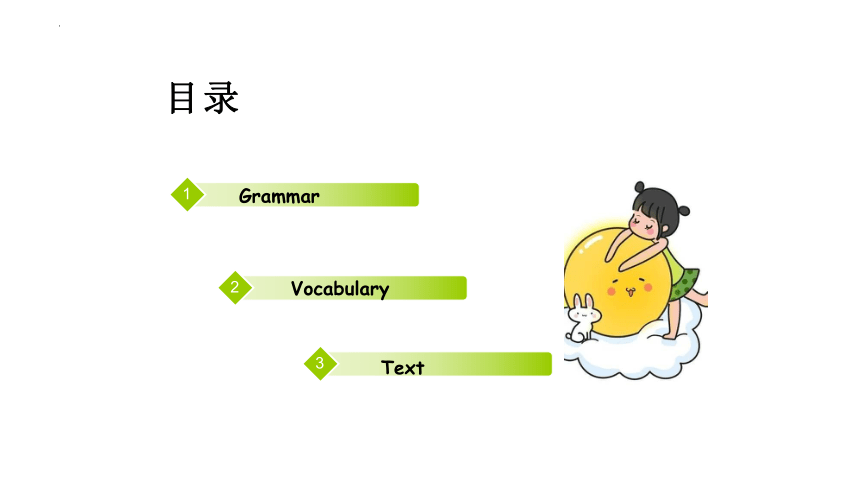
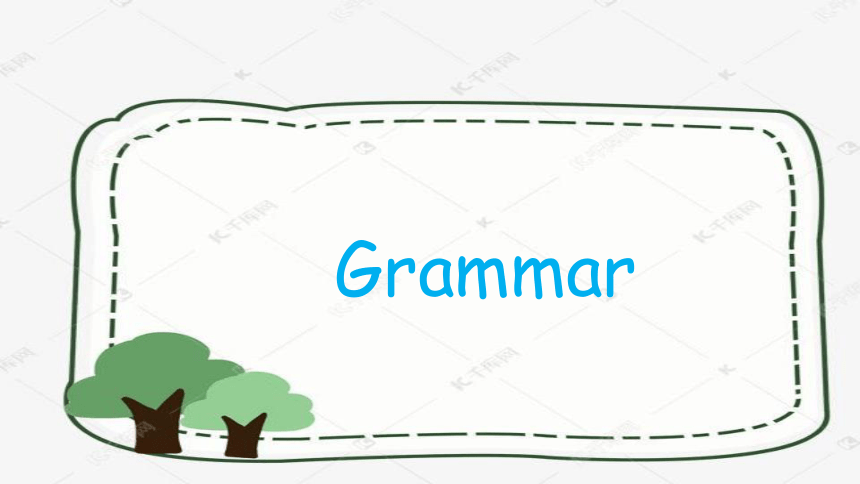
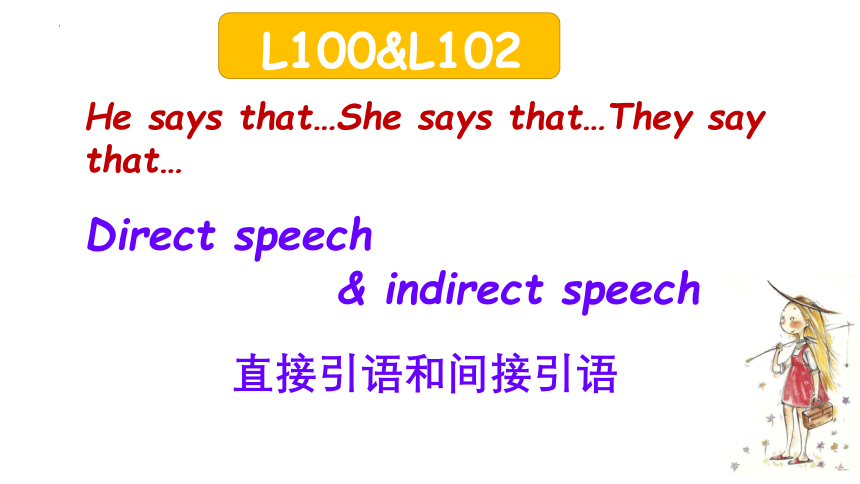
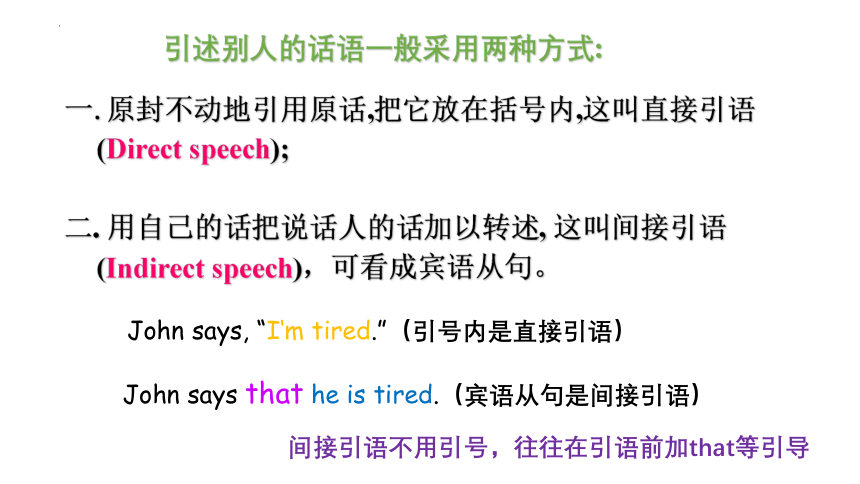
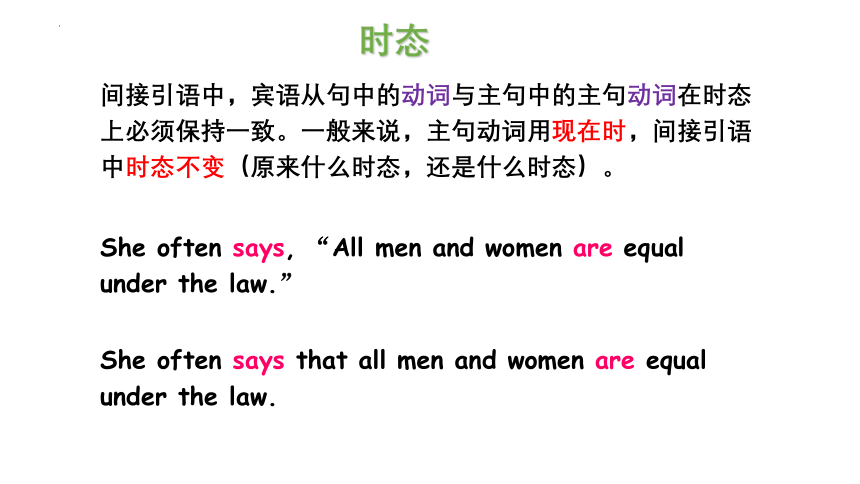
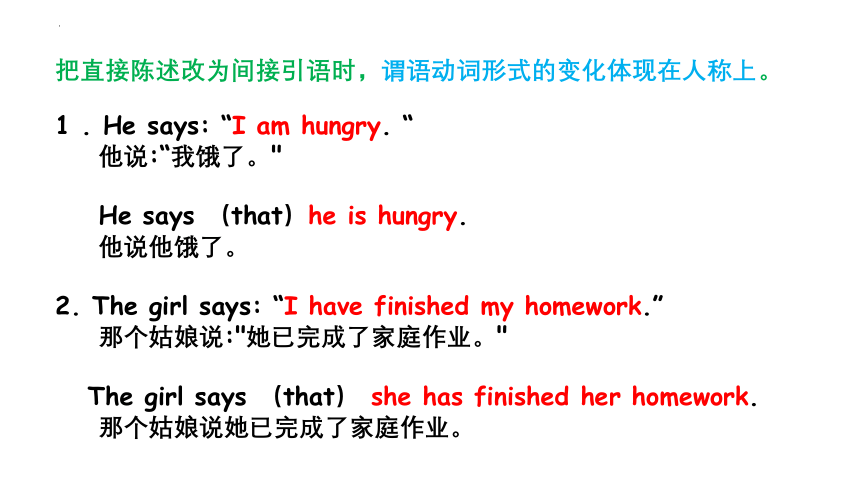
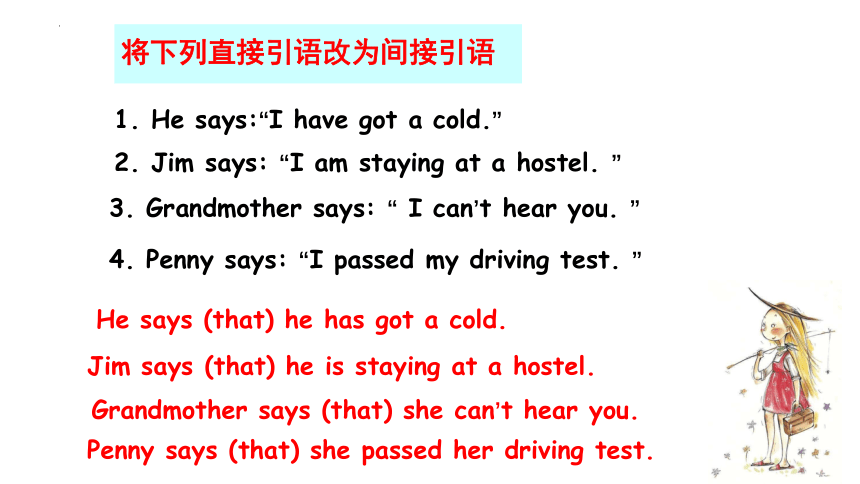
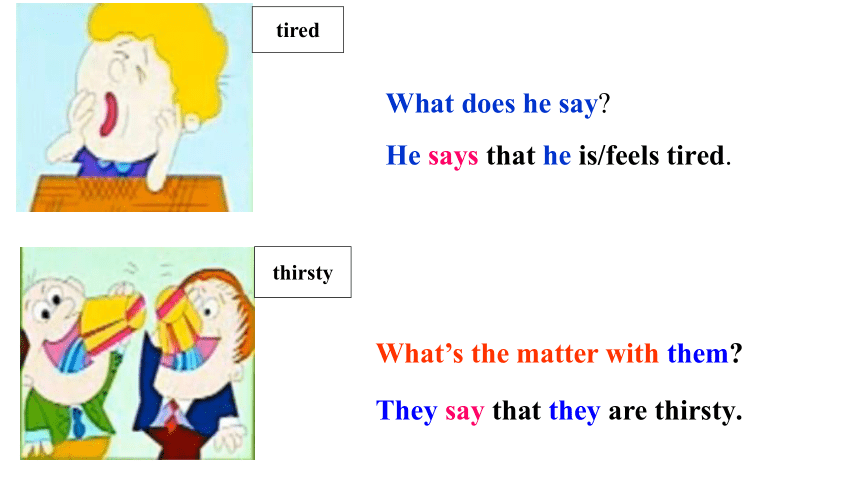
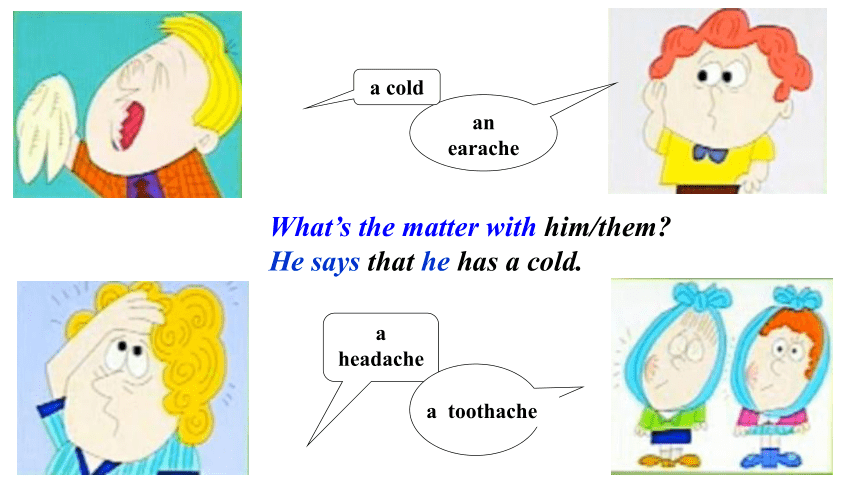
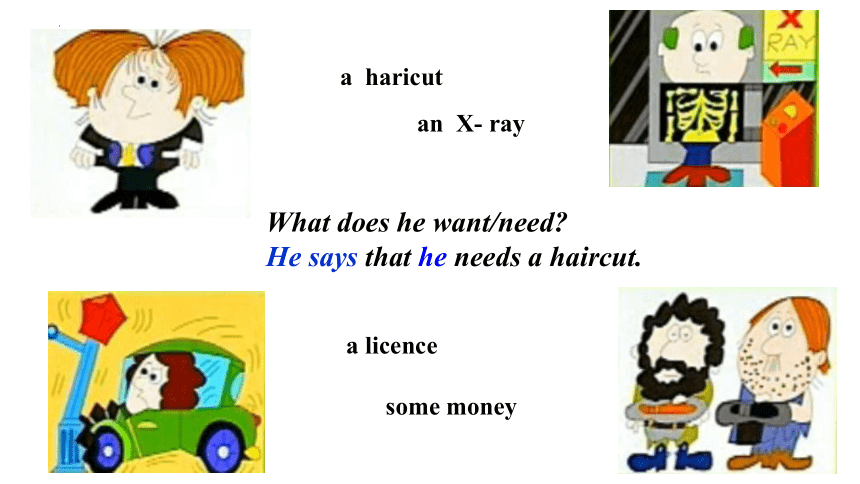
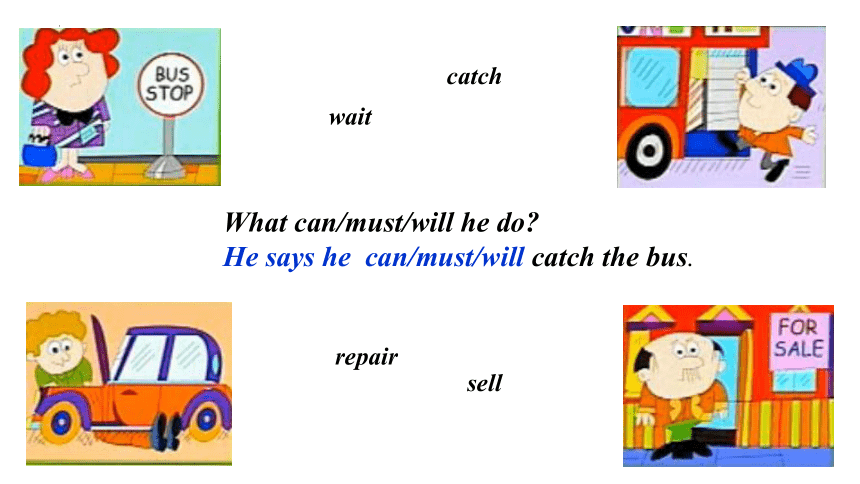
文档简介
(共68张PPT)
Lesson 99-102
少出门 多通风
勤洗手 戴口罩
Ow!
A card from Jimmy.
Grammar
1
Vocabulary
2
Text
3
目录
Grammar
Direct speech
直接引语和间接引语
& indirect speech
L100&L102
He says that…She says that…They say that…
原封不动地引用原话,把它放在括号内,这叫直接引语 (Direct speech);
二. 用自己的话把说话人的话加以转述, 这叫间接引语 (Indirect speech),可看成宾语从句。
John says, “I‘m tired.”(引号内是直接引语)
John says that he is tired.(宾语从句是间接引语)
引述别人的话语一般采用两种方式:
间接引语不用引号,往往在引语前加that等引导
间接引语中,宾语从句中的动词与主句中的主句动词在时态上必须保持一致。一般来说,主句动词用现在时,间接引语中时态不变(原来什么时态,还是什么时态)。
She often says, “All men and women are equal under the law.”
She often says that all men and women are equal under the law.
时态
1 . He says: “I am hungry. “
他说:“我饿了。"
He says (that)he is hungry.
他说他饿了。
2. The girl says: “I have finished my homework.”
那个姑娘说:"她已完成了家庭作业。"
The girl says (that) she has finished her homework.
那个姑娘说她已完成了家庭作业。
把直接陈述改为间接引语时,谓语动词形式的变化体现在人称上。
将下列直接引语改为间接引语
1. He says:“I have got a cold.”
2. Jim says: “I am staying at a hostel. ”
3. Grandmother says: “ I can’t hear you. ”
4. Penny says: “I passed my driving test. ”
He says (that) he has got a cold.
Jim says (that) he is staying at a hostel.
Grandmother says (that) she can’t hear you.
Penny says (that) she passed her driving test.
He says that he is/feels tired.
tired
thirsty
They say that they are thirsty.
What does he say
What’s the matter with them
an earache
a headache
a toothache
a cold
What’s the matter with him/them
He says that he has a cold.
a haricut
an X- ray
a licence
some money
What does he want/need
He says that he needs a haircut.
wait
catch
repair
sell
What can/must/will he do
He says he can/must/will catch the bus.
1.作动词宾语
I think that I’ve hurt my back.
2.作形容词的宾语
I’m afraid that you must see the doctor.
3.作介词宾语
This depends on how hard you work.
宾语从句
一、概念:用作宾语的句子。常用连词that引导。
宾语从句的时态受主句的限制
1. 主句是一般现在时态,从句根据实际情况而定。
2. 主句是一般过去时态,从句需是过去时态中的一种。
但是宾语从句表示的是客观真理或自然观念,其谓语时态仍用一般现在时。
二、宾语从句的时态
He said that he had left his umbrella in the library.
The teacher told the students that the Pacific Ocean is the largest ocean in the word.
宾语从句从句的语序必须是陈述序,既连接词+主语+谓语+其他成分
三、宾语从句的语序
I believe that they will come soon.
Vocabulary
What’s wrong with them
They slipped.
在楼梯上滑倒
slip on the stairs
我在结冰的路上滑倒了。(icy)
I slipped on the icy road.
slip
1. v. 滑倒,滑了一跤
a slip of the pen
a slip of the tongue
n. 疏忽,错误
笔误
口误
What is the matter with Ruo Xi
She fell downstairs.
她昨天掉进河里去了。
She fell into the river yesterday.
秋天叶子都落了 。
Leaves fall in fall.
fall
v. 落下,跌倒
fall / autumn
我最喜欢的季节是秋天。
My favorite season is fall.
waterfall
n.瀑布
n. 秋天
他从楼梯上摔下来,伤到了背部。
He fell downstairs and hurt his back.
hurt
v. 伤
lie on one’s back
面朝天躺着
侧卧
lie on one’s side
我的背部痛。
My back hurts.
back
n. 背,背部
sit down 坐下
倒立 stand on one’s head
stand behind 做…的后盾,支持…
我将一直支持你。
I will stand behind you all the time.
stand up
站立,站起来
help sb. to do sth
请帮我打扫下教室。
Please help me clean the classroom.
help
v. 帮助
help sb. with sth. 帮助某人某事
你能帮我学英语吗?
Can you help me with English
你肯定吗?
Are you sure
我肯定他会来。
I am sure that he will come.
sure
adj. 一定的,确信的
Text
1. What’s wrong with Andy
2. Must Andy go to see the doctor
Lesson 99 Ow!
Answer the two questions:
ANDY: Ow!
LUCY: What's the matter, Andy
ANDY: I slipped and fell downstairs.
LUCY: Have you hurt yourself
ANDY: Yes, I have.
I think that I've hurt my back.
LUCY: Try and stand up.
Can you stand up
Here.
Let me help you.
ANDY: I'm sorry, Lucy.
I'm afraid that I can't get up.
LUCY: I think that
the doctor had better see you.
I'll phone Dr. Carter.
LUCY: The doctor says that
he will come at once.
I'm sure that
you need an X-ray, Andy.
What’s the matter, Andy
What’s the matter = What’s wrong
=What happened
I slipped and fell downstairs.
downstairs是副词,修饰fell
fall off… 从…跌落
昨天夜里,她的奶奶从床上摔下来。
Her grandmother fell off the bed last night.
Have you hurt yourself
have/has+done(过去分词)
Yes, I have. I think that I’ve hurt my back.
I think 后面接宾语从句( that可省略)
I’ve hurt my back做think的宾语。
我想她己经上床睡觉了。(现在完成时)
I think that she has already gone to bed.
他认为他是正确的。
He thinks that he is right.
Try and stand up. Can you stand up
上楼来看一看吧
Come upstairs and see it.
去买条新裙子吧!
Go and buy a new dress.
去洗下你的手吧!
Go and wash your hands.
and 连接两个动词
我将设法找到他。
I will try to find him.
请尽力帮助她。
Please try to help her.
下次争取做得更好些
Try to do better next time.
我正在努力学好英语。
I'm trying to learn English well.
try to do …尽力,设法做…
他试着把真相告诉他的妈妈。
He tries telling his mother the truth.
辨析:
try to do sth. 表示“尽力……",强调付出努力,但不一定成功;
try doing表示"尝试干、干……试试",含有"看结果如何"之意。
try doing 试着…
我试着敲了敲后门,但没人回答。
I tried (knock) at the back door, but nobody answered.
knocking
Here. Let me help you.
Here 在这里是感叹词,意思是“来”或“喂”
let sb. do sth. 让某人做某事
让他走。
Let him go.
I’m sorry, Lucy.
I’m afraid that I can’t get up.
由that 引导,做afraid的宾语从句
我恐怕会迟到。
I’m afraid that I will be late.
恐怕明天会下雨。
I’m afraid (that) it will rain tomorrow.
get up ① 起床
② = stand up 站起来
I think that the doctor had better see you.
had better do sth. 最好…
你最好给你的妈妈打个电话。
You’d better call your mother now.
我们现在最好回到车站去。(L95)
We had better go back to the station now.
她最好告诉他真相。
She had better tell him the truth.
否定
had better do sth. 最好不…
你现在最好别跟他说话。
You had better not talk to him right now.
not
I’ll phone Dr. Carter.
phone the doctor = the doctor
Dr. = doctor ① 医生
② 博士
call
at once 马上,立刻
= immediately
常用于一般将来时。
I'm sure (that) you need an X-ray.
X –ray 以元音因素开头,故用 an
The doctor says (that) he will come at once.
Joe and downstairs.
A. slipped / fall B. slipped/ fall
C. slip / fell D. slipped / fell
2. Don’t worry! Let us you a hand.
A. give B. to give C. and give D. gave
D
A
Lesson 101
A card from Jimmy.
吉米的明信片
Vocabulary
Scotland n. 苏格兰
Scottish 苏格兰人
我从苏格兰来,我是苏格兰人。
I come from Scotland. I am Scottish.
我去过苏格兰五年。
I have been to Scotland for five years.
card n. 卡片
post card 明信片
ID card 身份证
play card 扑克
请出示你的身份证。
Please show me your ID card.
youth n. 青年
teenager 青少年
他说:“我是一个青年人。”
He says: ‘ I am a youth.’
他说:他是一个青年人。
He says he is a youth.
She lost her youth.
She kept her youth.
hostel n. 招待所, 旅馆
hotel ( Lesson 133)
Hotel is bigger better and more beautiful than hostel.
Youth Hostel 青年招待所
我现在住在一个青年招待所。
I am staying at a Youth Hostel.
association n. 协会
the Y. H. A. = the Youth Hostel Association
青年招待所协会 = 青招协
member n. 成员
a member of … 的成员 … 的会员
我是青招协的一个成员。
I am a member of the Y.H.A.
soon adv. 不久
我很快会写信的。
I will write a letter soon.
你们很快会见到我的。
You will see me soon.
as soon as
I will call you as soon as I arrive home.
write v. 写 (wrote / written )
write a (letter) to sb 给… 写(信)
write sb a (letter)
我很快会给你写信的。
I will write you a letter soon.
Text
1. What does Grandmother want Penny to read to her
Jimmy’s Card.
2. Where is Jimmy
He’s in Scotland.
3. Where does he say he’s staying
At a Youth Hostel.
Listening and answer
1.Read Jimmy's card to me please.
= Read me Jimmy’s card please.
2.‘I have just arrived in Scotland and I'm staying at a Youth Hostel.’
in+大地方,at+小地方。
3.Eh = What = Pardon
4.He says (that) he's just arrived in Scotland.
He says (that) he's staying at a Youth Hostel.
间接引语
5.You know (that) he's a member of the Y. H. A.
a member of... …的成员之一。
He is a member of our class.
6. What else does he say
else: “其他、另外”
7.‘I'll write a letter soon. I hope (that) you are all well.’
soon 不久之后,是一般将来时的标志词。
as soon as 一……就……
As soon as he comes, I’ll tell you.
8.Speak up.
= Louder, please.
9.I'm afraid (that) I can't hear you.
hear Can you hear me at the back
听见,及物动词,强调结果
listen to Listen to music, please!
听,不及物动词,强调动作
10.‘Love, Jimmy.’ 信的末尾表示问候的常用语。
=Yours, Jimmy.’
11.Is that all
That’s all for today.
12. He doesn't say very much, does he
反意疑问句:
定义:表示提问人的看法,但没有把握,需要对方的证实。
结构:陈述句+简短疑问句。前肯后否,前否后肯。
两部分的人称和时态要保持一致。
You are Jimmy, aren’t you
They won’t leave, will they
You are going to the park, aren't you
You haven't finished your homework, have you
You have a car, don't you
回答时要根据事实,Yes/No也要与后面一致:
No, he doesn’t. 是,他没写多少。
Yes, he does. 不,他写了很多。
1. 当陈述部分的主语是I,而句子又用来征询对方的意见时,疑问句的主语用you。
I think English very interesting, don’t you
I don’t like that film, do you
2. 当陈述部分的主语是everybody, someone, nobody等代词时,疑问句的主语通常用they。亦可用he,尤其是nobody等作主语,具有否定概念 时。
Somebody phoned while I was out, didn’t they
Nobody wants to go there, does he
反意疑问句
3.当陈述部分的主语是不定代词something, nothing时, 疑问句主语用it。
Something seems all right now, doesn’t it
Nothing is kept in good order, is it
4.当陈述部分的主语是指示代词this, that或these,those时,疑问句主语分别用it和they。
This is fun, isn’t it
These are your friends Tom and Jack, aren’t they
5.当陈述句为there be结构时,疑问句主语用there。如:
There’s no help for it, is there
There’s something wrong, isn’t there
6. 陈述部分带有seldom, never, few, little, nothing等
否定词或半否定词时,疑问部分用肯定形式。
Bob never plays football, does he
7. 在由“祈使句+附加疑问”构成的附加疑问句中,附加疑
问部分一般用 will you, won’t you, 也可用can you等。
Give me some cigarettes, can you
Let’s go for a trip this afternoon, shall we
Let us go out for a rest, will you
1. Tom does his homework every day,
2. He’s swimming now,
3. She doesn’t like maths,
4. They went to the beach yesterday,
5. They weren’t in Hangzhou last week,
6. He can speak little French,
7. He can speak a little French,
8. She never went to Shanghai,
9. Close the door,
10.Let us go out for a rest,
doesn’t he
isn’t he
does she
didn’t they
were they
can he
can't he
did she
can you
shall we
Practice
Homework
1.听读并背诵L99、L101的课文。
2.准备L199-102听写
3. 发L99-L102的录音(课文读一遍, 单词两遍)
4. 完成练习册及出门测`
5. 抄写单词
Lesson 99-102
少出门 多通风
勤洗手 戴口罩
Ow!
A card from Jimmy.
Grammar
1
Vocabulary
2
Text
3
目录
Grammar
Direct speech
直接引语和间接引语
& indirect speech
L100&L102
He says that…She says that…They say that…
原封不动地引用原话,把它放在括号内,这叫直接引语 (Direct speech);
二. 用自己的话把说话人的话加以转述, 这叫间接引语 (Indirect speech),可看成宾语从句。
John says, “I‘m tired.”(引号内是直接引语)
John says that he is tired.(宾语从句是间接引语)
引述别人的话语一般采用两种方式:
间接引语不用引号,往往在引语前加that等引导
间接引语中,宾语从句中的动词与主句中的主句动词在时态上必须保持一致。一般来说,主句动词用现在时,间接引语中时态不变(原来什么时态,还是什么时态)。
She often says, “All men and women are equal under the law.”
She often says that all men and women are equal under the law.
时态
1 . He says: “I am hungry. “
他说:“我饿了。"
He says (that)he is hungry.
他说他饿了。
2. The girl says: “I have finished my homework.”
那个姑娘说:"她已完成了家庭作业。"
The girl says (that) she has finished her homework.
那个姑娘说她已完成了家庭作业。
把直接陈述改为间接引语时,谓语动词形式的变化体现在人称上。
将下列直接引语改为间接引语
1. He says:“I have got a cold.”
2. Jim says: “I am staying at a hostel. ”
3. Grandmother says: “ I can’t hear you. ”
4. Penny says: “I passed my driving test. ”
He says (that) he has got a cold.
Jim says (that) he is staying at a hostel.
Grandmother says (that) she can’t hear you.
Penny says (that) she passed her driving test.
He says that he is/feels tired.
tired
thirsty
They say that they are thirsty.
What does he say
What’s the matter with them
an earache
a headache
a toothache
a cold
What’s the matter with him/them
He says that he has a cold.
a haricut
an X- ray
a licence
some money
What does he want/need
He says that he needs a haircut.
wait
catch
repair
sell
What can/must/will he do
He says he can/must/will catch the bus.
1.作动词宾语
I think that I’ve hurt my back.
2.作形容词的宾语
I’m afraid that you must see the doctor.
3.作介词宾语
This depends on how hard you work.
宾语从句
一、概念:用作宾语的句子。常用连词that引导。
宾语从句的时态受主句的限制
1. 主句是一般现在时态,从句根据实际情况而定。
2. 主句是一般过去时态,从句需是过去时态中的一种。
但是宾语从句表示的是客观真理或自然观念,其谓语时态仍用一般现在时。
二、宾语从句的时态
He said that he had left his umbrella in the library.
The teacher told the students that the Pacific Ocean is the largest ocean in the word.
宾语从句从句的语序必须是陈述序,既连接词+主语+谓语+其他成分
三、宾语从句的语序
I believe that they will come soon.
Vocabulary
What’s wrong with them
They slipped.
在楼梯上滑倒
slip on the stairs
我在结冰的路上滑倒了。(icy)
I slipped on the icy road.
slip
1. v. 滑倒,滑了一跤
a slip of the pen
a slip of the tongue
n. 疏忽,错误
笔误
口误
What is the matter with Ruo Xi
She fell downstairs.
她昨天掉进河里去了。
She fell into the river yesterday.
秋天叶子都落了 。
Leaves fall in fall.
fall
v. 落下,跌倒
fall / autumn
我最喜欢的季节是秋天。
My favorite season is fall.
waterfall
n.瀑布
n. 秋天
他从楼梯上摔下来,伤到了背部。
He fell downstairs and hurt his back.
hurt
v. 伤
lie on one’s back
面朝天躺着
侧卧
lie on one’s side
我的背部痛。
My back hurts.
back
n. 背,背部
sit down 坐下
倒立 stand on one’s head
stand behind 做…的后盾,支持…
我将一直支持你。
I will stand behind you all the time.
stand up
站立,站起来
help sb. to do sth
请帮我打扫下教室。
Please help me clean the classroom.
help
v. 帮助
help sb. with sth. 帮助某人某事
你能帮我学英语吗?
Can you help me with English
你肯定吗?
Are you sure
我肯定他会来。
I am sure that he will come.
sure
adj. 一定的,确信的
Text
1. What’s wrong with Andy
2. Must Andy go to see the doctor
Lesson 99 Ow!
Answer the two questions:
ANDY: Ow!
LUCY: What's the matter, Andy
ANDY: I slipped and fell downstairs.
LUCY: Have you hurt yourself
ANDY: Yes, I have.
I think that I've hurt my back.
LUCY: Try and stand up.
Can you stand up
Here.
Let me help you.
ANDY: I'm sorry, Lucy.
I'm afraid that I can't get up.
LUCY: I think that
the doctor had better see you.
I'll phone Dr. Carter.
LUCY: The doctor says that
he will come at once.
I'm sure that
you need an X-ray, Andy.
What’s the matter, Andy
What’s the matter = What’s wrong
=What happened
I slipped and fell downstairs.
downstairs是副词,修饰fell
fall off… 从…跌落
昨天夜里,她的奶奶从床上摔下来。
Her grandmother fell off the bed last night.
Have you hurt yourself
have/has+done(过去分词)
Yes, I have. I think that I’ve hurt my back.
I think 后面接宾语从句( that可省略)
I’ve hurt my back做think的宾语。
我想她己经上床睡觉了。(现在完成时)
I think that she has already gone to bed.
他认为他是正确的。
He thinks that he is right.
Try and stand up. Can you stand up
上楼来看一看吧
Come upstairs and see it.
去买条新裙子吧!
Go and buy a new dress.
去洗下你的手吧!
Go and wash your hands.
and 连接两个动词
我将设法找到他。
I will try to find him.
请尽力帮助她。
Please try to help her.
下次争取做得更好些
Try to do better next time.
我正在努力学好英语。
I'm trying to learn English well.
try to do …尽力,设法做…
他试着把真相告诉他的妈妈。
He tries telling his mother the truth.
辨析:
try to do sth. 表示“尽力……",强调付出努力,但不一定成功;
try doing表示"尝试干、干……试试",含有"看结果如何"之意。
try doing 试着…
我试着敲了敲后门,但没人回答。
I tried (knock) at the back door, but nobody answered.
knocking
Here. Let me help you.
Here 在这里是感叹词,意思是“来”或“喂”
let sb. do sth. 让某人做某事
让他走。
Let him go.
I’m sorry, Lucy.
I’m afraid that I can’t get up.
由that 引导,做afraid的宾语从句
我恐怕会迟到。
I’m afraid that I will be late.
恐怕明天会下雨。
I’m afraid (that) it will rain tomorrow.
get up ① 起床
② = stand up 站起来
I think that the doctor had better see you.
had better do sth. 最好…
你最好给你的妈妈打个电话。
You’d better call your mother now.
我们现在最好回到车站去。(L95)
We had better go back to the station now.
她最好告诉他真相。
She had better tell him the truth.
否定
had better do sth. 最好不…
你现在最好别跟他说话。
You had better not talk to him right now.
not
I’ll phone Dr. Carter.
phone the doctor = the doctor
Dr. = doctor ① 医生
② 博士
call
at once 马上,立刻
= immediately
常用于一般将来时。
I'm sure (that) you need an X-ray.
X –ray 以元音因素开头,故用 an
The doctor says (that) he will come at once.
Joe and downstairs.
A. slipped / fall B. slipped/ fall
C. slip / fell D. slipped / fell
2. Don’t worry! Let us you a hand.
A. give B. to give C. and give D. gave
D
A
Lesson 101
A card from Jimmy.
吉米的明信片
Vocabulary
Scotland n. 苏格兰
Scottish 苏格兰人
我从苏格兰来,我是苏格兰人。
I come from Scotland. I am Scottish.
我去过苏格兰五年。
I have been to Scotland for five years.
card n. 卡片
post card 明信片
ID card 身份证
play card 扑克
请出示你的身份证。
Please show me your ID card.
youth n. 青年
teenager 青少年
他说:“我是一个青年人。”
He says: ‘ I am a youth.’
他说:他是一个青年人。
He says he is a youth.
She lost her youth.
She kept her youth.
hostel n. 招待所, 旅馆
hotel ( Lesson 133)
Hotel is bigger better and more beautiful than hostel.
Youth Hostel 青年招待所
我现在住在一个青年招待所。
I am staying at a Youth Hostel.
association n. 协会
the Y. H. A. = the Youth Hostel Association
青年招待所协会 = 青招协
member n. 成员
a member of … 的成员 … 的会员
我是青招协的一个成员。
I am a member of the Y.H.A.
soon adv. 不久
我很快会写信的。
I will write a letter soon.
你们很快会见到我的。
You will see me soon.
as soon as
I will call you as soon as I arrive home.
write v. 写 (wrote / written )
write a (letter) to sb 给… 写(信)
write sb a (letter)
我很快会给你写信的。
I will write you a letter soon.
Text
1. What does Grandmother want Penny to read to her
Jimmy’s Card.
2. Where is Jimmy
He’s in Scotland.
3. Where does he say he’s staying
At a Youth Hostel.
Listening and answer
1.Read Jimmy's card to me please.
= Read me Jimmy’s card please.
2.‘I have just arrived in Scotland and I'm staying at a Youth Hostel.’
in+大地方,at+小地方。
3.Eh = What = Pardon
4.He says (that) he's just arrived in Scotland.
He says (that) he's staying at a Youth Hostel.
间接引语
5.You know (that) he's a member of the Y. H. A.
a member of... …的成员之一。
He is a member of our class.
6. What else does he say
else: “其他、另外”
7.‘I'll write a letter soon. I hope (that) you are all well.’
soon 不久之后,是一般将来时的标志词。
as soon as 一……就……
As soon as he comes, I’ll tell you.
8.Speak up.
= Louder, please.
9.I'm afraid (that) I can't hear you.
hear Can you hear me at the back
听见,及物动词,强调结果
listen to Listen to music, please!
听,不及物动词,强调动作
10.‘Love, Jimmy.’ 信的末尾表示问候的常用语。
=Yours, Jimmy.’
11.Is that all
That’s all for today.
12. He doesn't say very much, does he
反意疑问句:
定义:表示提问人的看法,但没有把握,需要对方的证实。
结构:陈述句+简短疑问句。前肯后否,前否后肯。
两部分的人称和时态要保持一致。
You are Jimmy, aren’t you
They won’t leave, will they
You are going to the park, aren't you
You haven't finished your homework, have you
You have a car, don't you
回答时要根据事实,Yes/No也要与后面一致:
No, he doesn’t. 是,他没写多少。
Yes, he does. 不,他写了很多。
1. 当陈述部分的主语是I,而句子又用来征询对方的意见时,疑问句的主语用you。
I think English very interesting, don’t you
I don’t like that film, do you
2. 当陈述部分的主语是everybody, someone, nobody等代词时,疑问句的主语通常用they。亦可用he,尤其是nobody等作主语,具有否定概念 时。
Somebody phoned while I was out, didn’t they
Nobody wants to go there, does he
反意疑问句
3.当陈述部分的主语是不定代词something, nothing时, 疑问句主语用it。
Something seems all right now, doesn’t it
Nothing is kept in good order, is it
4.当陈述部分的主语是指示代词this, that或these,those时,疑问句主语分别用it和they。
This is fun, isn’t it
These are your friends Tom and Jack, aren’t they
5.当陈述句为there be结构时,疑问句主语用there。如:
There’s no help for it, is there
There’s something wrong, isn’t there
6. 陈述部分带有seldom, never, few, little, nothing等
否定词或半否定词时,疑问部分用肯定形式。
Bob never plays football, does he
7. 在由“祈使句+附加疑问”构成的附加疑问句中,附加疑
问部分一般用 will you, won’t you, 也可用can you等。
Give me some cigarettes, can you
Let’s go for a trip this afternoon, shall we
Let us go out for a rest, will you
1. Tom does his homework every day,
2. He’s swimming now,
3. She doesn’t like maths,
4. They went to the beach yesterday,
5. They weren’t in Hangzhou last week,
6. He can speak little French,
7. He can speak a little French,
8. She never went to Shanghai,
9. Close the door,
10.Let us go out for a rest,
doesn’t he
isn’t he
does she
didn’t they
were they
can he
can't he
did she
can you
shall we
Practice
Homework
1.听读并背诵L99、L101的课文。
2.准备L199-102听写
3. 发L99-L102的录音(课文读一遍, 单词两遍)
4. 完成练习册及出门测`
5. 抄写单词
同课章节目录
